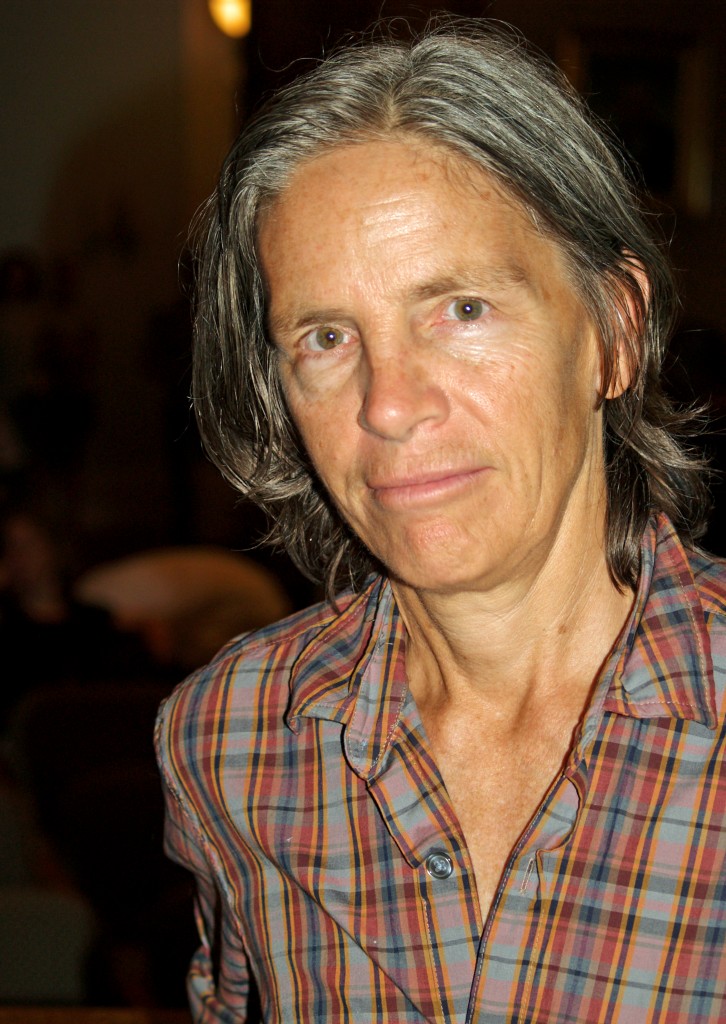...There is an argument
for poetry being deep but I am not that argument.
Eileen Myles, “A Poem,” Not Me
I BECAME INTERESTED in Eileen Myles not because of Transparent, or even her poetry, but because of her relationship with the young poet Leopoldine Core. You might be familiar with Myles’ proclivity for younger women from the character on Transparent, Leslie Mackinaw, obviously modeled on her, who is originally shown with her arm draped around a nubile waif. Allie wonders if she is, in her late twenties, too old for her, again obviously imitating life as Jill Soloway — much younger than Myles, but much older than Core — is now very publicly partnered with the poet. Digressions aside, the point is that I came to Myles backwards, starting with a some lesbian gossip and working my way back to her early writing.
I don’t know for sure whether the rest of her new audience came to her backwards as well, from Transparent to her poetry and fiction, but given that a small amount of TV viewings — let’s say 100,000 — would make a book a bestseller, I think it’s a safe bet. This makes perfect sense to me: no poet becomes truly famous by merit of their art. Poetry might be the very antimatter of fame. It’s only poets who find themselves perfectly positioned at a cultural intersection who find themselves celebrated in the mainstream, like, say Whitman or Ginsberg. Maybe it’s not a coincidence that these two poets, as well as Myles, are queer — she has been said to bring “a gay woman’s voice to an aesthetic dominated by gay men” — but it’s certainly not a coincidence that they’re all white.
Eileen Myles’ recent fame strikes me as an awkward situation. She has long been a cult icon in the lesbian and poetry communities, but cult icons retain their status based on a certain moment in time. The cult film perhaps best embodies this concept, as it can never change and impinge on its own future; this is why remakes can be so grievous. In fact, Myles’ newfound fame feels like something of a remake — not people coming to their senses about what in history was truly great and important, but trying to squeeze capital out of something that will never be as relevant as it should be. Back in the ’70s, she was a badass, but now, her brand of lesbian macho seems second-wave, her whiteness is glaring, her equation of vaginas and gender oppression makes me cringe.
Her best, most relevant poetry, in my opinion, was written before the year 2000. Even the poem Allie reads on Transparent, “I always put my pussy,” was published in 1995 in Maxfield Parrish. I like this poem, although it makes me nervous because I know that Myles and I disagree on the poetical and political meaning of pussies. Poems read on television aside, her early work has the most energy and clarity, and her political messages were far more effective:
...I spin dreams
of the quotidian out of words I
could not help but choose.
They reflect my educational background,
the educational situation of
my parents and the countries
their parents came from. My words
are also chemical reflections”
The Irony of the Leash, The Irony of the Leash, 1978
Compare this to the stilted attempt at racial consciousness in the new work included in I Must Be Living Twice:
...I
have no
reason to think
that
your ancestors
were stolen
from their
home in A-
frica
and because
of my not
knowing that this
is true
but thinking
that it
is possible
it makes
me certain
that respect
next time
would be
for me
“London Exchange,” New Poems, I Must Be Living Twice
The awkwardness of phrasing and word choice in this poem is so extreme, it’s clear to me she’s out of her depth. I found the same awkwardness in the bizarre, cissexist agenda she published with Jill Soloway, The Thanksgiving Paris Manifesto:
All primary positions of power (including but not limited to presidents and queens,
prime ministers, cabinet ministers and their ombudsmen, kings, comptrollers,
their representatives and congresspeople, alderpeople, senators, lords and mayors) must be
held by female-identified or vagina-bodied people.
The stutter of “female-identified” OR “vagina-bodied” — a phrase I would love to never see again — is horrible in quite a similar way to the breaking up of “Africa” into two lines. That is, it’s problematic, and even beyond that, just plain perplexing.
Straight people might do well to understand that their interest in queer culture often seems capricious at best. They have a weird habit of labeling anything LGBT that manages to scrape into the mainstream as a “trend,” as if straightness is eternal and the rest of us are just blips. The truth is that all of us are fleeting, and very few of us make it into eternity. If it looks like Eileen Myles is going to be the ONE queer woman poet that makes it, you might forgive us for feeling cheated. What about June Jordan? Audre Lorde? Or, among those living who could still attend red carpets, Robin Coste Lewis or CA Conrad? As queer poets surrounded by each other, it’s hard to ignore the way a representative was chosen for us, raising her to a position both tokenized and privileged.
If you read her poetry, you’ll see that Eileen Myles has always wanted to be famous. Case in point, her poem “April Noon,” included in I Must Be Living Twice:
1,000,000 women
not me moving through
the street tonight
of this filmy
city & I
crown myself
again & again
and there
can’t be
two kings.
"April Noon,” Not Me, 1991
Myles couldn’t have known how film-y her life would get, but she never needed us to crown her king. She was doing it all along — she even ran for president in 1992. We just have to decide if and how we’ll serve her. I, for one, can never be a loyal subject.
Ironically, that might put me closer in line with her than ever. Take her treatment of “The Death of Robert Lowell”:
O, I don’t give a shit.
He was an old white-haired man
Insensate beyond belief and
Filled with much anxiety about his imagined
Pain. Not that I’d know
I hate fucking wasps.
“On the Death of Robert Lowell,” A Fresh Young Voice from the Plains
I definitely don’t have such harsh words for Myles, but I think she would understand that when you have a critical impulse like that, no one is spared. But unlike Lowell, she’s not dead yet, and it’s way too early to give a final verdict on her life and work. She’s already lived twice, and I’ll certainly be watching and reading what comes next.

















